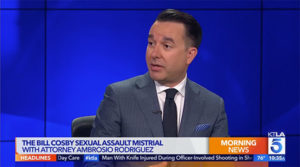Los Angeles Felony Offense Lawyer

A felony charge in Los Angeles can turn your life upside down, even if you’re innocent. The devastating consequences include harsh penalties, a criminal record that haunts you, and long-lasting damage to your future.
Navigating the criminal justice system here can overwhelm you, especially when your freedom hangs in the balance.
At The Rodriguez Law Group Los Angeles Criminal Defense Attorneys, we get how high the stakes are with felony charges. You’ll find a Los Angeles felony offense lawyer passionately advocating for clients facing these life-altering accusations.
With deep knowledge of California’s criminal laws and the local courts, we carefully build a strong defense tailored to your unique situation.
Having the right criminal defense lawyer will make or break your case when facing felony charges. Our attorneys leave no stone unturned. We thoroughly investigate the charges, poke holes in the prosecution’s evidence, and vigorously protect your rights.
Whether you face accusations of a violent crime, drug offense, or white-collar crime, our firm wields the skill and resources to fight tooth and nail for you.
You can count on us to tirelessly defend you against even the most serious allegations with skilled, unwavering legal representation.
Why Choose Our Los Angeles Felony Offense Lawyers

At The Rodriguez Law Group Los Angeles Criminal Defense Attorneys, facing felony charges doesn’t have to be a journey you take alone. Our dedicated team, led by founding attorney Ambrosio E. Rodriguez, brings a comprehensive and compassionate approach to defending those accused of felony offenses in Los Angeles.
Here’s why choosing us means choosing a path toward the best possible outcome in your case:
Unparalleled Experience and Insight
With decades of criminal law experience, including 13 years as a Senior Deputy District Attorney, Ambrosio E. Rodriguez possesses an invaluable perspective on the prosecution’s strategies.
This unique insight allows us to craft defenses that effectively counter the state’s tactics and secure your freedom.
Comprehensive Legal Support
From the moment you choose us, expect nothing less than meticulous legal advice tailored to your case’s specifics. We are committed to protecting your constitutional rights every step of the way, ensuring you are fully informed to make crucial decisions about your case.
Rigorous Case Investigation
Our team dives deep into the details of your case, uncovering motives behind false accusations and gathering exculpatory evidence. This thorough investigation is pivotal in building a defense strategy that challenges the prosecution’s narrative.
Focused on Optimal Outcomes
Whether fighting for charge reductions, dismissals, reduced penalties, or alternative sentencing, we’re dedicated to achieving the best outcome. We minimize the impact of the charges on your life and future.
Legal Professionals
Joining Ambrosio E. Rodriguez is a team of accomplished attorneys, each bringing their skill and experience.
With over eight years as a District Attorney, Sommer Salam offers a prosecutorial perspective that enriches our defense strategies.
Robert Reiley, a civil litigator and graduate from the University of Southern California Gould School of Law, and Joseph Kazazian, with a solid background in federal and state criminal defense, complete our powerhouse team.
Together, we leverage our collective knowledge to defend you vigorously.
Exploiting Prosecution Weaknesses
Our approach includes meticulously analyzing the prosecution’s case for any vulnerabilities and arguing that they have not met the burden of proof. This strategic defense can be the difference between conviction and acquittal.
Choosing The Rodriguez Law Group Los Angeles Criminal Defense Attorneys means partnering with a team that understands the intricacies of criminal law and genuinely cares about your case and its outcome.
With our blend of experience, insight, and dedication, we stand ready to defend your rights and work tirelessly for your future. Trust us to navigate the complexities of your felony charge with the skill and diligence it demands.
Understanding Felony Charges

Learning what constitutes a felony, the classifications involved, and the potential consequences of a conviction can help you navigate the legal process’s complexities better.
What Constitutes a Felony Charge?
A felony charge is grave. It’s more severe than a misdemeanor charge. Felonies are for crimes that really hurt society or other people. They include damaging property, stealing, assault, murder, and certain drug crimes.
The key element about felonies is that they have the potential to cause major harm or show an intent to do something morally wrong and malicious.
Classifications of Felonies
The government categorizes felonies into classes or degrees, with each class specifying the severity of the offense and the range of punishment they bring.
While classification systems vary by jurisdiction, they generally range from Class 1 or Class A (the most serious) to Class 5 or Class E (the least serious).
First-degree felonies include crimes like murder or rape, carrying the heaviest penalties, while lower-degree felonies include non-violent crimes such as certain types of theft or drug possession.
The complexity and stakes of felony charges make informed legal counsel a necessity.
Potential Consequences of a Felony Conviction

The consequences of a felony conviction are profound and extend beyond prison time.
They include:
- Incarceration: Felonies can result in a year or more in state or federal prison, the exact duration of which depends on the crime’s severity and the applicable laws.
- Fines and Restitution: As part of their sentence, convicted individuals may face substantial penalties and have to pay restitution to victims.
- Loss of Rights: Felony convictions can result in the loss of certain civil rights, such as voting, serving on a jury, and possessing firearms.
- Impact on Employment and Housing: Having a felony record can significantly hinder one’s ability to secure employment, professional licensing, or housing, affecting life long after the sentence concludes.
Understanding these facets of felony charges highlights the importance of securing skilled legal representation.
A knowledgeable attorney can navigate the legal system, advocate on your behalf, and strive for the best possible outcome, whether through reducing charges, arguing for leniency in sentencing, or proving innocence.
Defense Strategies for Felony Charges

The felony defense strategy you adopt significantly influences the case outcome. A well-crafted defense plan considers the case’s unique circumstances, leveraging legal knowledge and procedural tactics to protect the defendant’s rights and strive for the most favorable result.
Here are key defense strategies:
Challenging the Evidence

One crucial strategy when defending against felony charges is carefully examining all the prosecution’s evidence to identify problems or issues.
For example, did the police violate your rights by illegally searching you or your property without a proper reason? If so, any evidence they obtained that way may not be allowed at trial.
Getting key evidence thrown out severely weakens the prosecution’s case against you.
Proving an Alibi
Presenting an alibi is a powerful defense strategy, especially in cases where defense attorneys verify the defendant’s location during the crime through independent witnesses or tangible evidence such as video footage.
An effective alibi creates reasonable doubt regarding the defendant’s involvement in the crime, potentially leading to an acquittal.
Negotiating Plea Deals

Negotiating a plea deal is prudent when the evidence against the defendant is strong. Plea bargaining involves the defendant agreeing to plead guilty to a lesser charge or the original charge in exchange for a lighter sentence.
This approach reduces the uncertainty of trial outcomes and achieves a more lenient sentence than might be imposed if convicted at trial.
Asserting Self-Defense
For charges involving violent crimes, claiming self-defense is a viable strategy if the defendant can demonstrate that their actions were a necessary response to an immediate threat of harm.
This defense requires showing that the force used was proportional to the threat and that the defendant reasonably feared imminent danger.
Challenging the Credibility of Witnesses
Cross-examination challenges the credibility of prosecution witnesses, exposing inconsistencies or biases in their testimonies. Discrediting witnesses undermines the prosecution’s case, casting doubt on the defendant’s guilt.
Utilizing Expert Witnesses
Sometimes, the defense may benefit from the testimony of expert witnesses who provide specialized knowledge or opinions that support the defense’s case.
For instance, forensic analysts, medical professionals, or mental health experts offer insights that challenge the prosecution’s narrative or establish mitigating circumstances.
Constitutional Violations
A defense strategy may also focus on procedural errors or violations of the defendant’s constitutional rights during the investigation or trial.
Examples include inadequate representation, prosecutorial misconduct, or a lack of a speedy trial. Identifying such violations can lead to a dismissal of charges or a retrial.
Each defense strategy requires a thorough analysis of the case’s facts, a deep understanding of the law, and a strategic approach to presenting the defense’s case.
The choice of strategy depends on the details and complexities of the case, underscoring the importance of experienced legal representation to navigate the challenges of defending against felony charges.
Your Rights After an Arrest

A felony charge is a profoundly disorienting experience, but you have rights designed to protect your freedom and ensure fair treatment under the law.
Understanding and effectively exercising these rights has a huge impact on the outcome of your case.
Here’s what you need to know:
The Right to Remain Silent
Under the Fifth Amendment, you have the right to remain silent to avoid self-incrimination. From the moment of your arrest, you are not obligated to answer questions from law enforcement officials about the alleged crime.
Politely but firmly, you can state, “I wish to remain silent and would like to speak with an attorney.” This helps prevent providing any statements that will be used against you in court.
The Right to an Attorney
The Sixth Amendment guarantees your right to legal representation. This means you can request an attorney immediately after being arrested. The court will appoint a public defender if you cannot afford one.
Exercise this right before answering any questions, as an attorney will guide you through the legal process, protect your rights, and work to secure the best possible outcome for your case.
How to Exercise These Rights Effectively
Having these inalienable rights doesn’t do any good if you don’t use them.
Here’s what to do:
- Invoke Your Rights: Be explicit when invoking your rights. Clearly state that you wish to remain silent and request an attorney. Ambiguous statements lead to misunderstandings about your intentions.
- Do Not Resist Arrest: Resisting arrest can lead to additional charges and complicate your case. Comply with the officer’s instructions during the arrest process while remembering your rights.
- Avoid Discussing Your Case: After invoking your rights, do not discuss your case with anyone other than your attorney. Conversations with law enforcement, cellmates, or even family and friends might inadvertently harm your defense.
- Contact an Attorney as Soon as Possible: Time is critical in legal proceedings. Contacting an attorney immediately allows for a timely evaluation of your case, protecting your rights, and developing a defense strategy.

Learning and exercising these fundamental rights make navigating the challenges of facing felony charges much easier.
Always remember that your rights are to protect you, and effective use of these rights is a critical element of a robust defense strategy. Hire a criminal defense law firm in Los Angeles, CA in your case.


